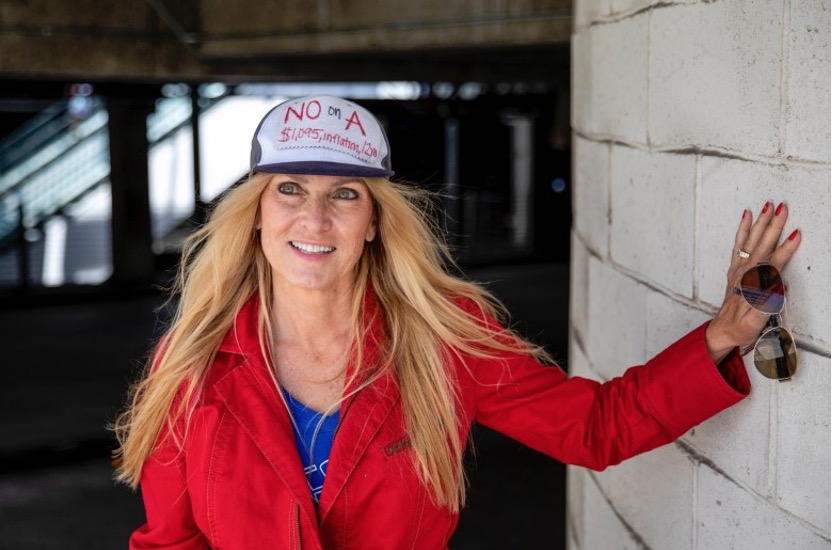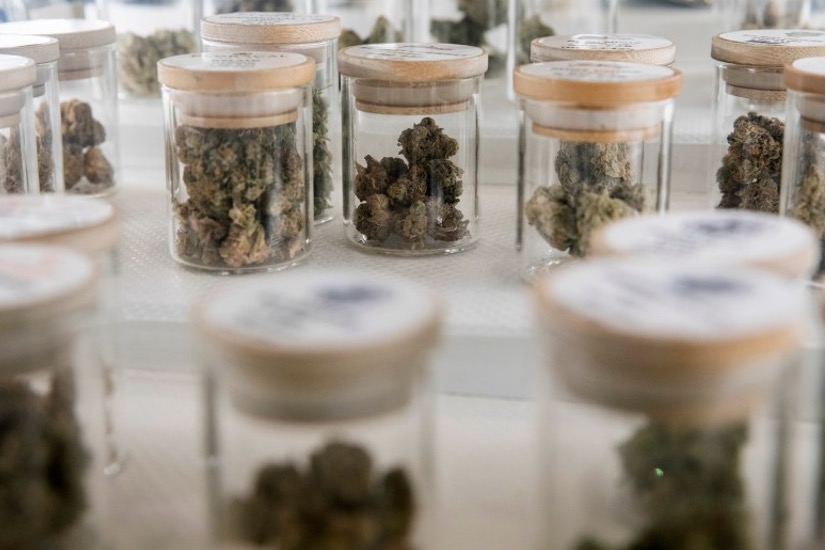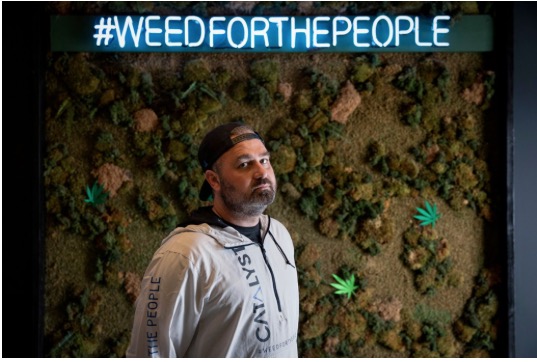Comments420 FILE - Working regular overnight shifts has distorted Samantha Kadera’s sleep schedule, so the emergency room doctor smokes cannabis a few times a week to relax before bed.
It’s a common habit among the young parents that Kadera knows in Manhattan Beach, the upscale Los Angeles suburb where she moved last year to raise her two elementary school-aged children in a more family-friendly environment.
But there are no dispensaries in the city; officials banned them five years ago after voters legalized recreational cannabis in California, concerned about attracting criminal activity and advertising aimed at minors. So Kadera stops at a store on her way to and from the Westside L.A. hospital where she works.
Changes loom if Manhattan Beach residents approve an initiative this fall to allow as many as two licensed cannabis businesses. It has triggered an increasingly acrimonious battle between a local entrepreneur eager to gain a foothold in a fresh market and city leaders determined to protect what they see as the character of their community.
“They do like to keep us in a bubble,” Kadera, 40, said one evening as she strolled with her dog along the Strand, a beachside path lined with multimillion-dollar homes. “But the reality is, there’s widespread use, so it would be nice to have it around here.”
Rapidly shifting attitudes — and a nascent legal industry still struggling to stabilize itself — have thrust cannabis back onto ballots across the state, six years after voters approved Proposition 64 to authorize Californians who are at least 21 years old to buy, grow and use it for recreational purposes.
A provision in that 2016 measure gave local governments discretion to ban cannabis businesses — and the vast majority of them did. More than 60% of cities and counties do not allow retail sales, according to the state, and while most of California’s most populous places do permit dispensaries, there are strict limits in many of them.
Desperate to expand where they can operate and to compete with a still-dominant illicit market, many in the cannabis industry have pushed state leaders to override Prop. 64 and open the entirety of California to retail sales.
But it’s a nonstarter at the state Capitol, where local control generally rules the day. A bill this session that would have only required local governments to permit medical cannabis businesseswas quickly scaled back to a guarantee for patient access to delivery options.
So frustrated cannabis users and companies are turning their attention to the local level, launching municipal campaigns to pry open the holdouts, one at a time.
‘Voters have lost their patience’
Hirsh Jain, founder of the cannabis consulting firm Ananda Strategy, has tracked about two dozen cities over the past year — from Red Bluff to Sausalito to Santee — where citizen initiative drives are qualifying for the ballot or pressuring local officials to develop their own ordinances to regulate and tax cannabis sales.
“The ballot initiative is a way to get the elected officials to stare reality in the face that their citizens want this,” Jain said, pointing to a fall 2019 poll from the UC Berkeley Institute of Governmental Studies that found public support for legal cannabis had only increased since Prop. 64. Nearly two-thirds of respondents favored allowing commercial dispensaries in their communities.
“Voters have lost their patience,” he said. “They might be willing to cut their elected officials some slack, but after a while, they’re going to take matters into their own hands.”
Enter Elliot Lewis, a self-described “motherf—ing hustler to the core” and the founder of Catalyst Cannabis Co., which operates 11 dispensaries, mainly in Southern California. He and fellow executives at the company are aggressively pursuing a strategy to force their way into cities that continue to ban retail cannabis sales.
They have funded initiatives to require dispensary licenses in Manhattan Beach and three of its neighbors in the South Bay — Redondo Beach, Hermosa Beach and El Segundo — which each represent a crown jewel of the untapped legal cannabis market:wealthy and touristy, with a voter base that firmly backed Prop. 64. Voters in all four cities will get a chance to weigh in on permitting cannabis sales in either November or next March.
In his profane and zealous style — alternately hilarious and intimidating — Lewis defends his approach as more than a business venture. It is a political statement, a frontal assault on the principle of local control that he believes the “Karens and Chadwick Moneybags” who run city governments worship with Biblical reverence, often flouting the will of their own constituents.
“You’re talking about cocktail-party-donor people. I don’t think they understand where the zeitgeist of the younger generation is,” Lewis said. “You’ve metaphorically got to take a gun to their head, because that’s just how they operate.”
‘It doesn’t fit with our community’
The rising tension over the future of cannabis access in California is perhaps best captured by Manhattan Beach, a surfing hotspot of 35,000 residents, most famous for its iconic concrete pier.
Though 62% of the city’s voters supported Prop. 64, officials remain skeptical about cannabis dispensaries. City council members say there has been no groundswell of demand for retail sales among their constituents, including some who complain about being duped and coerced into signing the initiative petitions.
“It’s about money. There’s a lot of money in the South Bay and the dispensary owners know this,” Mayor Steve Napolitano told CalMatters in an email. “So why have pot shops that residents don’t need or want, just to enrich a few owners?”
To fight the initiative, the council directed city staff last month to develop competing measures for the November ballot that would uphold the ban on dispensaries and establish regulations, including a 25% sales tax, to make opening a dispensary prohibitively expensive.
“It doesn’t fit with our community. It certainly doesn’t fit with the development of our community,” said Hildy Stern, a Manhattan Beach councilmember who served as mayor this spring while the city debated how to respond to the initiative.
Stern, a mother of four who said she could not remember how she voted on Prop. 64, called it “distressing” that retail cannabis sales might be imposed by outsiders whose values do not fit with Manhattan Beach’s “small-town, family-oriented nature.” The city banned public smoking and tobacco sales in recent years — rare steps even for liberal California — to reduce beach pollution and vaping by students.
“I do not feel that the retail sale of cannabis in Manhattan Beach is appropriate,” Stern said. “I really am concerned about how access increases normalization to our youth.”
‘It cheapens a high-end beach town’
That sentiment has framed the public debate in Manhattan Beach, which prides itself on its top-performing schools.
Loading up her car with groceries outside the Vons downtown, Amy McAvin, 51, a bookkeeper who has lived in the city her whole life, said she worries about cannabis becoming even easier for kids to get.
A mother of two teenagers, McAvin assumed her children would use cannabis, so she encouraged them to develop safe habits, such as only smoking in social situations and not driving afterwards. She said she smoked herself when she was younger and voted for Prop. 64, but “I just don’t really condone it.”
“I’m not going to be out there picketing” if the initiative passes, she said. “We could just put other things in place of a dispensary.”
The litany of objections around town is long: The community is too residential. Dispensaries would attract undesirable visitors. It would be hypocritical to allow cannabis sales after banning tobacco. Those who want cannabis can already easily get it by delivery or driving to a nearby city.

Manhattan Beach resident Charlene Harding, who said she opposes cannabis shops because they don’t fit the vibe of Manhattan Beach, is pictured on May 27, 2022. Photo by Alisha Jucevic for CalMatters
“It cheapens a high-end beach town,” said Charlene Harding, 59, a retired government worker who moved to Manhattan Beach two decades ago. Though she has “never even puffed,” she said she did not care if others smoked — within reason: “I hate when I go to the beach and it smells like skunk.”
The opposition is far from universal, however, despite what city officials say they have heard.
David Sulaski, 54, a retired investment banker who has lived in Manhattan Beach for six years, said the city was full of “fun-loving people” who would embrace dispensaries.

Manhattan Beach resident David Sulaski, who supports cannabis shops opening, is pictured with his dog Stella in Manhattan Beach on May 27, 2022. Photo by Alisha Jucevic for CalMatters
“This is a community that likes to have a good time,” he said as he walked his dog down Manhattan Avenue in the city’s commercial center. “I don’t know why we make decisions that fly in the face of those things.”
Sulaski, who uses cannabis “every day that I can” and gets it delivered, said it was silly to make people go elsewhere to buy cannabis when Manhattan Beach could benefit from the tax revenue.
“We don’t expect our freedoms to be restricted in California. We could live in a red state for that,” he said. “Just give people what they want.”
‘Weed doesn’t change that’
Tax revenue may be the most compelling reason for cities to finally allow retail sales. Officials in Redondo Beach estimate that each license could generate as much as $1 million per year for the city.
State regulations also require testing cannabis products to ensure they are free of contaminants before they can be sold in licensed dispensaries, a safeguard that does not exist on the illicit market.
Derek Glunts, who grew up in Manhattan Beach, began smoking in high school and bought cannabis that he said was cut with chemicals at an illegal dispensary that presented itself as a church.
“Every single product they sold there was fake. They would turn black within a week and genuinely our lungs would hurt afterwards.” Glunts said. “I had a friend who was coughing up brown stuff from his lungs repeatedly for weeks and weeks after smoking some of the stuff he bought.”
The 21-year-old student was recruited last year to serve as the proponent for the Manhattan Beach initiative by a childhood friend, who had already signed on as a proponent for the petition in Redondo Beach. Both were longtime customers at Catalyst Cannabis.
Glunts, who has a medical cannabis prescription to treat anxiety and depression, said he enjoys smoking because “it takes the edge off things” and connects him to a community, though he has been taking a break in recent months to focus on his mental health.
Not even old enough to vote when Prop. 64 was on the ballot, Glunts said he was proud to be starting a conversation around cannabis use in a community that has long acted as though it wasn’t happening there. His family is in full support, he said, and the response has been overwhelmingly positive, aside from elitist and traditional residents who worry about riffraff coming to Manhattan Beach just to buy cannabis.
“The biggest battle is just getting over that stigma, that image,” he said. “Weed doesn’t change that. It’s not like weed’s going to come in to Manhattan Beach and all of a sudden, the schools are going to start performing poorly, people are going to move away, we’re going to have a bunch of bachelors move in. That’s not the reality.”
‘They’ve had six years to figure this out’
The Catalyst Cannabis team’s strategy was to target places where support for Prop. 64 was high and “city councils were just dithering and failing to act,” Lewis said.
Splitting the approximately $300,000 cost with another cannabis brand, Tradecraft Farms, they circulated petitions last year to overturn the bans on retail sales in the four beach cities. Once they collected signatures from at least 10% of registered voters, officials could either adopt the ordinances as written or put them to the ballot.
Their model was El Monte, a city in the San Gabriel Valley where the team first tested this blueprint three years ago. After presenting the city with enough signatures, the council ratified the ordinance, rather than hold an election, because the voters had already affirmed their support for legal cannabis with Prop. 64. The first dispensary, operated by Catalyst, opened last October.
None of the cities in the South Bay followed suit, however. The firm resistance caught Lewis by surprise, and he said he regrets not engaging with local officials to try to get them on board before launching the initiatives. He acknowledges that the sneak attack may have undercut any opportunity to reach a compromise and avert an election fight, though he also believes “incompetent” council members are using his approach as an excuse for their underlying opposition to cannabis.
“It just hits them in a way that they’re not used to. But I am who I am,” he said. “They’ve had six years to figure this out.”
While Manhattan Beach plots to uphold its ban on retail cannabis sales, its neighbors have not gone quite as far in their opposition. Hermosa Beach and El Segundo, which are set to vote in November on allowing two storefronts each, are considering adding competing measures to the ballot that would create a local cannabis tax or allow dispensaries under more restrictive rules.
Redondo Beach, the biggest of the beach cities and the most valuable potential prize among them, has signaled the most openness to the commercial cannabis market.
Before banning retail sales in 2017, the city council deliberated allowing dispensaries, and it established a steering committee to continue exploring that option. The local mall, the South Bay Galleria, has been particularly enthusiastic about serving as a potential site as it struggles to recover from losing its anchor department store.

Different varieties of cannabis flower are on display at one of the Catalyst Cannabis Co. dispensary locations in Long Beach on May 27, 2022. Photo by Alisha Jucevic for CalMatters
Those discussions, however, languished for years, which the Catalyst team cited as an impetus for taking the issue to voters. Redondo Beach Mayor Bill Brand, who has used cannabis to treat the nausea from chemotherapy for lung cancer, said the city always planned to repeal the sales ban, but it was not a priority, especially during the coronavirus pandemic.
“I haven’t had people in the community beating down on our door to do anything,” he said. “We tend to focus on things the community’s concerned about.”
‘Slash-and-burn strategy’
The qualification of Catalyst’s initiative, which would allow as many as three dispensaries in Redondo Beach, has made it unavoidable.
City council members punted the measure to the March 2023 ballot, giving them more time to finish developing their own ordinance based on recommendations from the steering committee. That more restrictive framework — which would only allow two retailers, impose a 5% sales tax and establish a 1,500-foot buffer zone around schools — is on track for approval as soon as August.
Councilmember Zein Obagi Jr. said the city wanted to strike a “reasonable” balance that would better accommodate feedback from residents, many of whom he said do not oppose cannabis but are wary of a dispensary opening near where they live or their children walk to school. Like other local officials in the South Bay, he vehemently opposes the proposal from the Catalyst team, which he calls a “slash-and-burn strategy” to create a commercial cannabis monopoly.
“They framed this initiative to virtually give themselves a license,” Obagi said. “This didn’t sit right with any of us.”
These accusations set Lewis off. He repeatedly denies that he is trying to establish a monopoly — yet he admits there are criteria written into the initiatives that would benefit Catalyst when applying for a dispensary license. The system cities would use to evaluate applicants, for example, awards points for being a union operator, which Catalyst is. The company already leases properties in Manhattan Beach and El Segundo that fall within the eligible areas for cannabis businesses.
“We’d be stupid if we didn’t try to take a little bit of an advantage,” Lewis said. “But those self-serving things are very, very mildly self-serving.”
Now, tensions between Catalyst and the beach cities are only deepening — Lewis is circulating a petition to recall Obagi, whom he calls “fake” and a “douchebag” — and it seems increasingly likely that they are headed to a campaign showdown. That means spending more money on a political fight that Catalyst and its allies cannot use to build out their businesses.
Still, it may be worthwhile for Lewis, who said he could probably pay off what he’s invested in the initiatives with just one new store in the South Bay, though he worries that the city officials will scheme to block his applications for a license.
“They’ll make sure I lose,” he predicted. “On a good day, if I get one or two, I’ll be f—ing happy.”
And despite the bad blood his approach has generated, Lewis is ready to try again, perhaps with some slight modifications. He said he’s considering targeting as many as 10 more cities across California over the next year.
“If the initiative is bad, step the f— out of the way,” he warned. “It’s called democracy. Let the voters decide.”
(Alexei Koseff covers Gov. Gavin Newsom, the Legislature and California government from Sacramento. He joined CalMatters in January 2022 after previously reporting on the Capitol for The Sacramento Bee.)














